Holiday Safety Tips
Valentine's Day
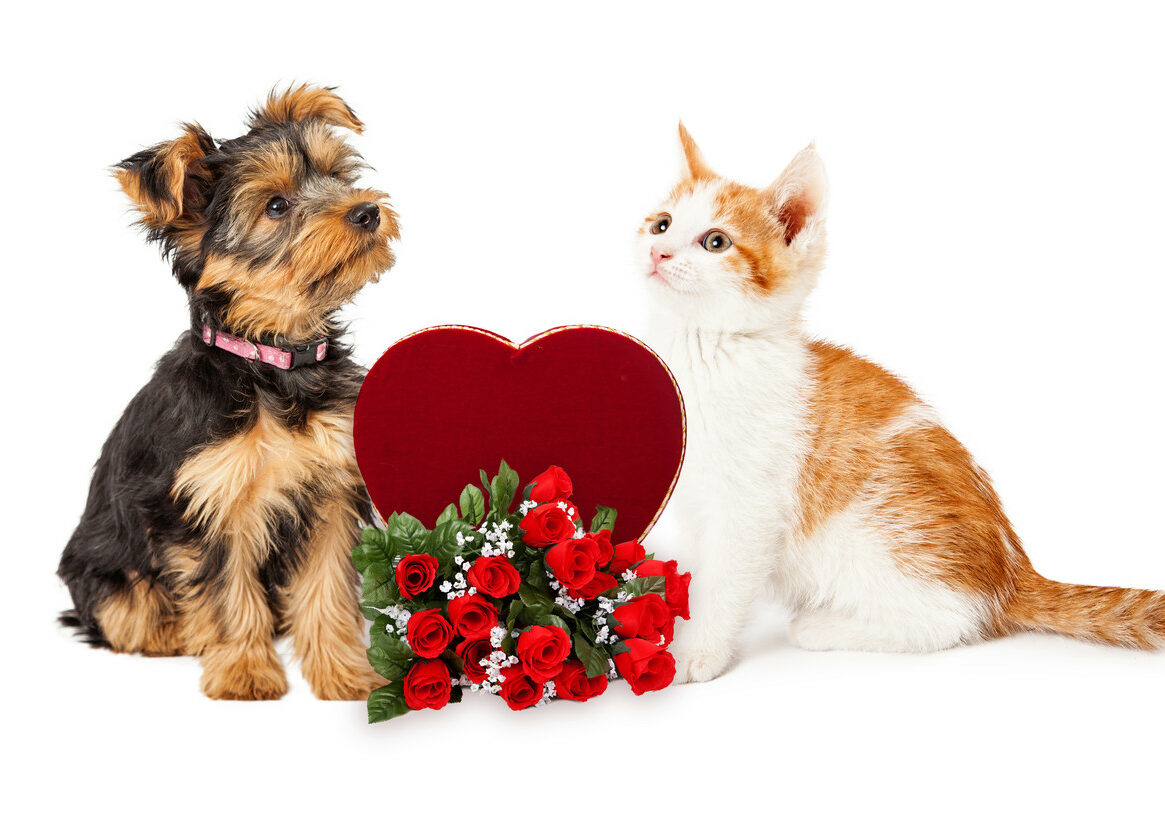
CHOCOLATE: Chocolate can be fatal to your dog or cat so all those sweets must be kept well out of reach. The darker the chocolate, the more toxic it is. Chocolate contains a caffeine-like stimulant substance that can cause vomiting, diarrhea, hyperactivity, increased pulse, even seizures. In addition, the fat content in candy and chocolate can cause harm to a pet’s pancreas.
FLOWERS: The smell may be too much for pets to resist. Many plants and flowers are poisonous to pets. All forms of lilies are fatally poisonous. If you want to give flowers to anyone that has pets, please check the ASPCA list of toxic and non-toxic plants / flowers first,
VASE FULL OF FLOWERS:–Pets love to get into new things that have arrived at your home. If you have animal safe flowers or plants in a vase of water, please don’t add aspirin to the water to preserve them. Cats especially like drinking water out of vases and aspirin is toxic to them.
CAFFEINE & ALCOHOL: If you are trying to have a romantic engagement, remember that your pets always want to join in. Some cats and dogs seem to enjoy alcoholic drinks. Keep an eye on where everyone puts their drinks that include caffeine or alcohol and don’t let pets partake.
FRESH WATER: Make sure your pet always has fresh water. When there is excitement in the air, they may feel the excitement too and need more fresh water.
GIFTING PETS: Pets need permanent homes. They are not disposable, should not be re-gifted, and they may not be returnable. If you love someone, make sure they are ready for a pet. Adopt as a loving prepared couple, rather than giving an animal like a box of chocolates
STUFFED ANIMALS: Remember pets love toys and they can’t always understand which ones are only for humans. Eyes and other items on stuffed animals can lead to choking or blockages if ingested, so keep human-only stuffed animals in a safe place.
Easter Day
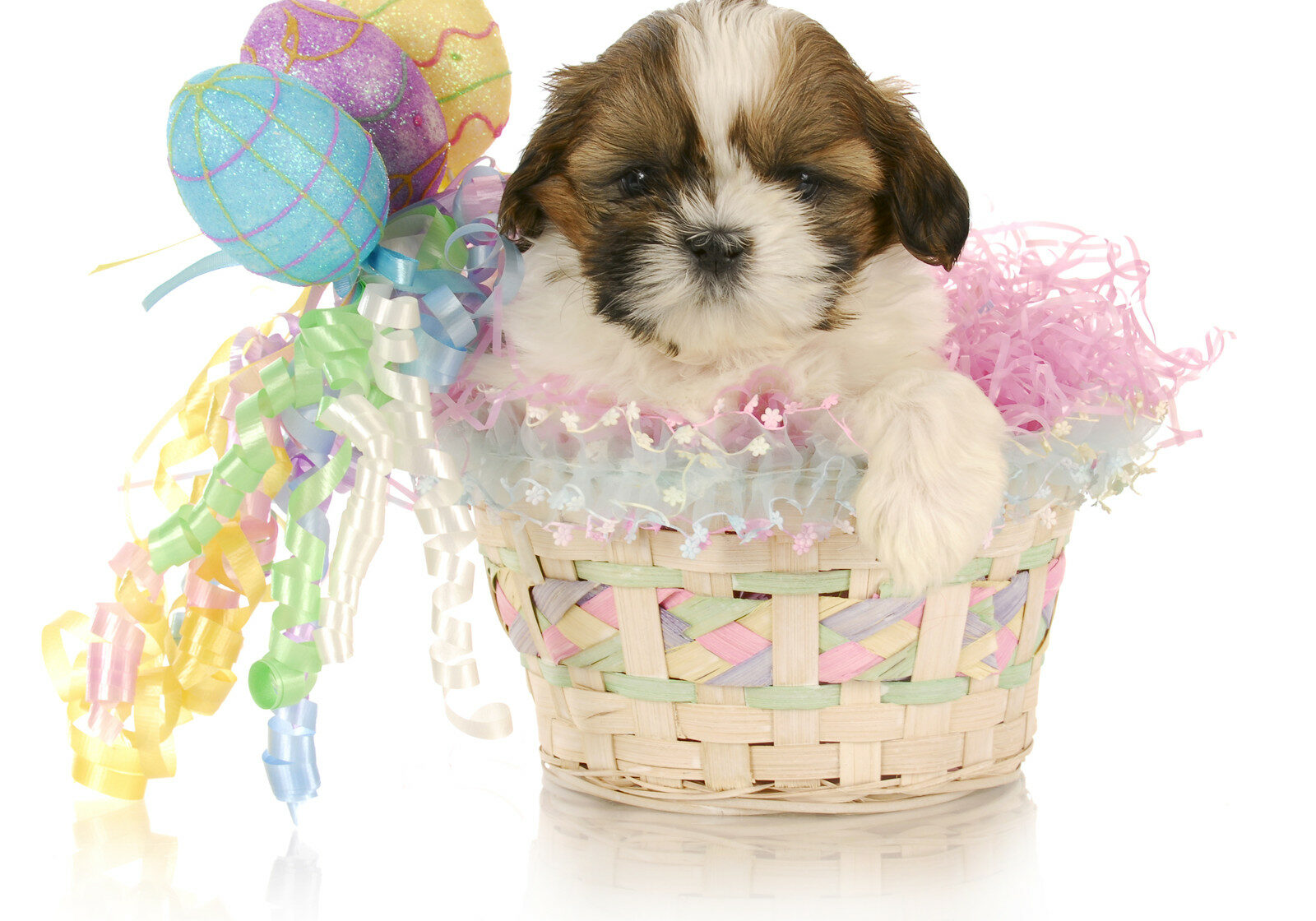

CHOCOLATE: Like Valentine's Day, another popular candy is chocolate - especially chocolate easter eggs! The darker the chocolate, the more toxic it is. Chocolate contains a caffeine-like stimulant substance that can cause vomiting, diarrhea, hyperactivity, increased pulse, and even seizures. In addition, the fat content in candy and chocolate can cause harm to a pet’s pancreas. If your pet ingests chocolate, contact your local vet or emergency vet hospital immediately.
OTHER SWEETS & BAKED GOODS: Not only are they often too rich for pets; an artificial sweetener often found in baked goods, candy and chewing gum called XYLITOL has been linked to liver failure and death in dogs.
TABLE SCRAPS: including gravy and meat fat –also should be kept away from pets. Many foods that are healthy for people are poisonous to pets, including onions, raisins and grapes. During the holidays, when our own diets tend toward extra-rich foods, table scraps can be especially fattening and hard for animals to digest and can cause pancreatitis.
EASTER LILIES: Many plants and flowers are poisonous to pets - especially cats. Lilies can be poisonous or fatal especially to cats. Prior to giving flowers to anyone that has pets, please check the ASPCA list of toxic and non-toxic plants / flowers first,
HOME DECORATION: Pets love to get into new things that have arrived at your home. The colorful plastic grass, the Easter tinsel, and Styrofoam eggs are popular for pets to chew on or ingest. These items can lead to an obstructed digestive tract, vomiting and dehydration.
STUFFED ANIMALS: Remember pets love toys and they can’t always understand which ones are only for humans. Eyes and other items on stuffed animals can lead to choking or blockages if ingested, so keep human only appropriate stuffed animals in a safe place.
FRESH WATER: Make sure your pet always has fresh water. When there is excitement in the air during holiday celebrations, they may feel the excitement too and may be more active than usual. Keep them safe and hydrated.
HOUSE EXITS: Even if your pets are comfortable around guests, make sure you watch them closely, especially when people are entering or leaving your home. While you’re welcoming guests, a four-legged family member may make a break for it out the door and become lost. With this in mind, make sure your pets have some form of identification (tags, microchip)
July 4th Holiday
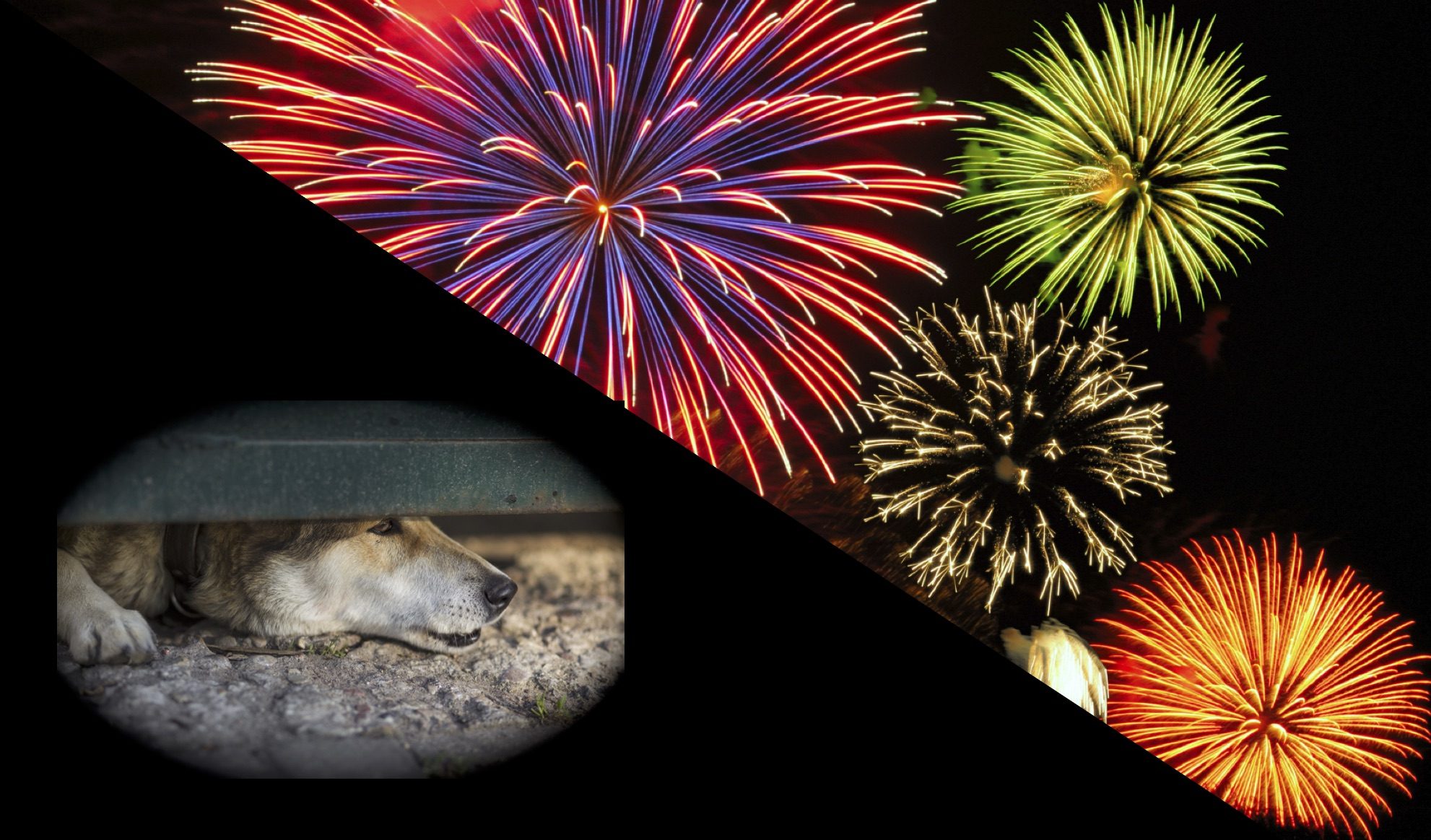
More Pets Get Lost On July 4th Than Any Other Holiday In The Year
Fourth of July traditions can be great fun for PEOPLE, but may be frightening and even dangerous for your pets. Fireworks can be very stressful due to their sensitive hearing, and potentially dangerous debris can end up lying on the ground where pets can eat it.
Here are some safety tips to keep you pets safe during fireworks.
Keep Pets Indoors: Ensure your pets are inside the house before fireworks begin. This helps to reduce their exposure to loud noises and flashing lights.
Close windows and curtains: Closing windows and curtains helps to muffle the sound of fireworks and reduces the bright flashes that can scare pets.
Provide distractions: Turn on the TV or some calming music to help drown out the noise from fireworks. Offer your pet some toys or treats to keep them occupied.
Identification: Ensure your pet has proper identification, such as a collar with ID tags or a microchip with updated contact information. This is crucial in case they get scared and run away.
Stay with your pet: If possible, stay home with your pet during fireworks displays. Your presence can be comforting and reassuring to them.
Avoid exposure: If there are fireworks in your area on multiple days, try to plan activities indoors or away from the noise to minimize your pet's exposure.
By taking these precautions, you can help ensure that your pets stay safe and comfortable during fireworks displays.
Halloween Day
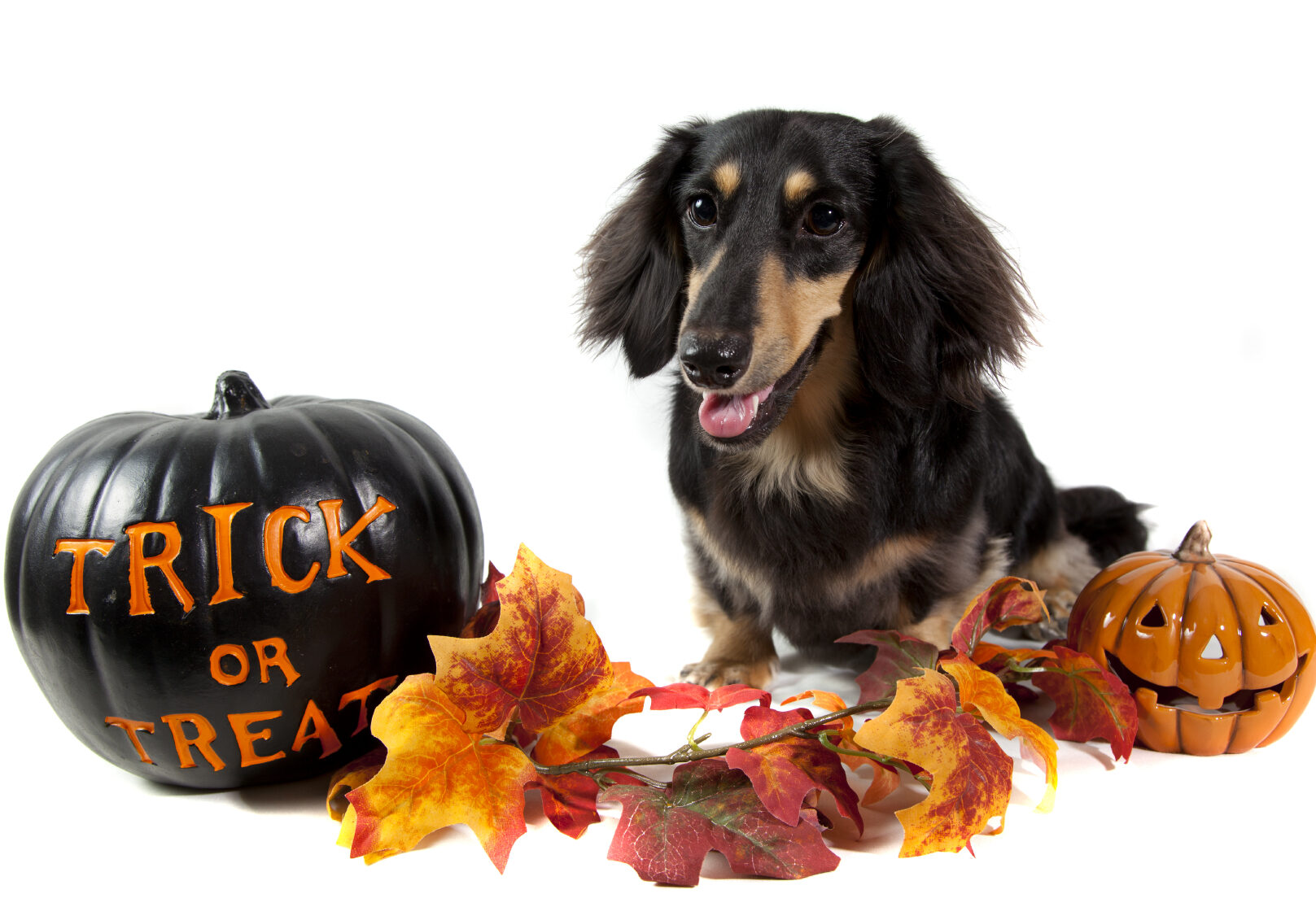
It’s almost the scariest night of the year for you and your pet! The CCADT recommends taking preventative steps and precautions this Halloween to keep your pet safe all the way through the celebrations.
Keep your pets safely indoors, away from trick-or-treaters and other Halloween activities.
Make sure that all of your pets are wearing tags with current ID. Opening the door repeatedly for trick-or-treaters creates plenty of escape opportunities.
Keep candy out of your pets’ reach. Chocolate and other ingredients can be toxic to them.
Pet Costumes. Most pets are happiest wearing nothing, but their birthday suit. Costumes and masks can make your pets uncomfortable or even cause injury.
Decorations can be dangerous. Be sure to keep them safely away from pets. Candle flames can set fire to a pet’s fur. Hanging or dangling decorations can be an entanglement or choking hazard to some animals.
Use fake cobwebs sparingly, if at all. Pets can choke on fake cobwebs set up indoors. Outdoors, fake webs may be a hazard to birds and wildlife.
When going out trick-or-treating, leave your dog at home. Dogs can be easily excited by the Halloween commotion and a dog bite or lost dog will quickly end the evening’s fun.
Popular Halloween plants such as pumpkins and decorative corn are considered to be relatively nontoxic, but they can produce stomach upset in pets that nibble on them.
A carved pumpkin certainly is festive, but do exercise caution if you choose to add a candle. Pets can easily knock a lit pumpkin over and cause a fire. Curious kittens especially run the risk of getting burned or singed by candle flames.
Wires and cords from electric lights and other decorations should be kept out of reach of your pets. If chewed, your pet might suffer cuts, burns, or receive a possibly life-threatening electrical shock.
Thanksgiving Day
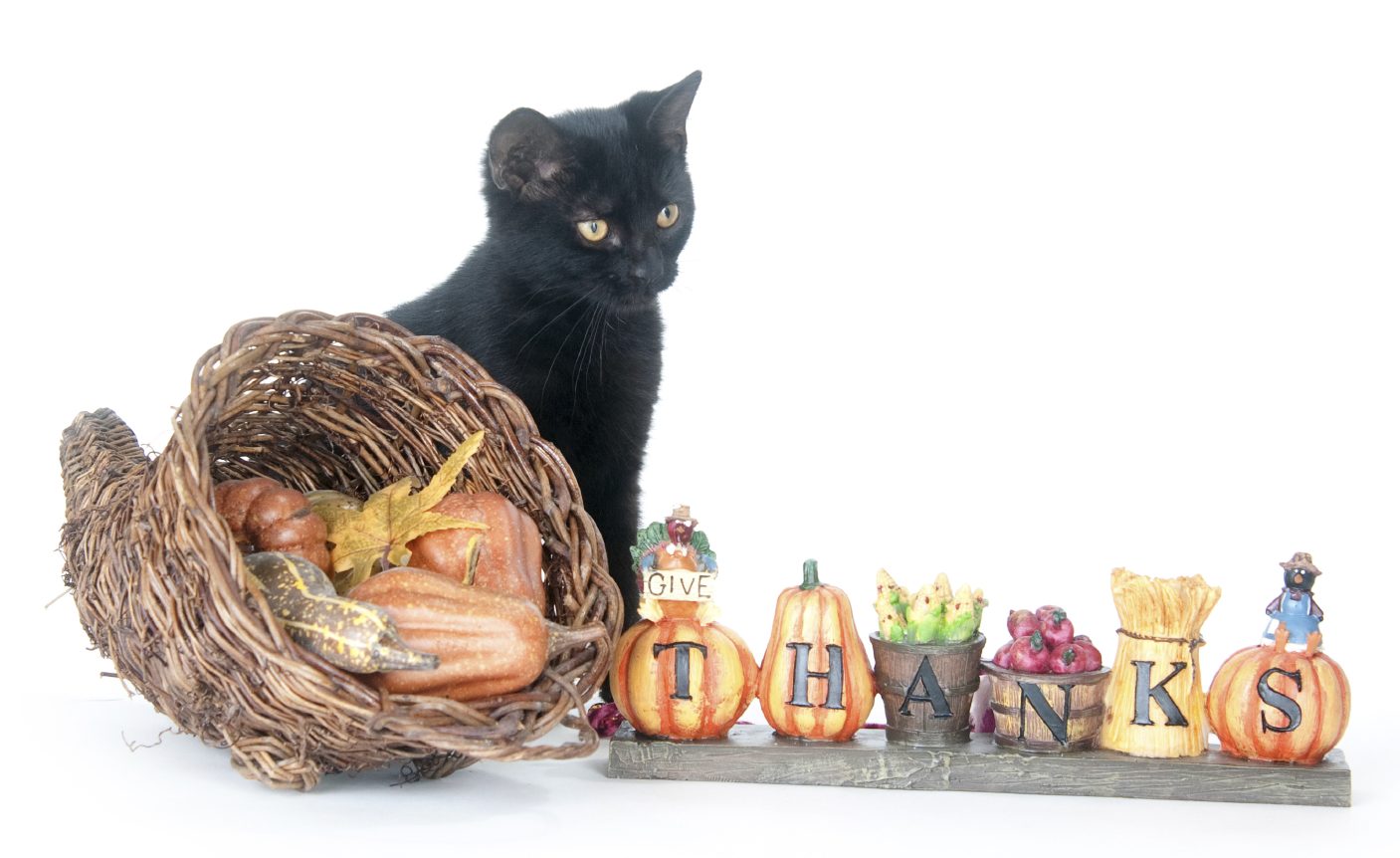
Thanksgiving is a special time to share with family and friends. We gather to share gratitude for all we are so fortunate to have. Cooks create delicious holiday aromas that fill the air. Celebration time with family and food can lead pet parents to become overly generous to their pets.
Diet and Exercise - Maintain your pet’s regular meal and exercise schedule and avoid feeding them any holiday leftovers. A disruption in his dietary routine can cause stomach upset, diarrhea and/or vomiting.
Fatty Foods - Too many fatty, rich, or unfamiliar foods can give your pet pancreatitis or gastroenteritis; two medical conditions that can be very painful and even life-threatening.
Healthy Treat Alternative - Pour on a bit of pet gravy to make their regular meal special, this way you give your pet a treat and make it feel like you’re sharing the feast with them but also won’t upset their stomach.
Bones - Make no bones about it. Certain bones can lacerate or obstruct your pets’ insides. Save the bones for the broth – not your dog.
Onions and Sage - Onions and onion powder, widely found in stuffing and used as a general seasoning, will destroy your dog or cat’s red blood cells, which can lead to anemia. Sage and some other herbs have essential oils that can cause upset stomachs and central nervous system depression if a dog eats them in large quantities. Most pets aren’t going to nosh on a fistful of sage, but keep herbs out of reach just in case. Stuffing usually contains many ingredients toxic to animals.
Bread and Rolls - Make sure to let dough rise in the microwave or oven, out of your pet’s reach. The yeast can ferment in his stomach and cause serious problems, such as alcohol poisoning. Ice water can help deactivate the yeast while you get him to the vet.
Grapes and Raisins - Grapes and raisins contain a toxin that can cause kidney damage to both dogs and cats.
Chocolate - Chocolate can actually be fatal to your dog or cat so all those sweets must be kept well out of reach. Watch for animals snitching while you are concentrating on baking.
Food Wrappings and Strings - Aluminum foil, wax paper and other food wrappings can cause intestinal obstruction. Make sure to place these items securely in the garbage. Baking strings, if ingested, can create trouble if ingested by your pet.
Caffeine and Alcohol - Avoid yappy-hour! Some cats and dogs seem to enjoy alcoholic drinks. Animals and booze are a bad mix. You won’t have to worry about a YouTube moment, you will have to worry about them becoming disoriented and quite ill so keep an eye on where everyone puts their drinks.
Garbage - Keep an eye on the garbage and keep it securely fastened! If your pet gets into it, he may think he’s hit the jackpot, but all he’ll be winning is health problems from something as simple as gastric disturbance, vomiting and diarrhea to the worst-case scenario – death
Quiet Time - Make sure your pet has a quiet retreat should the holiday festivities be too much for him. Watch her behavior to make sure she is not stressed.
Fresh Water - Make sure your pet always has fresh water. When there are more people in the house, there’s more chance to bump into the water bowl leaving your pet dry.
Christmas Day / New Year's
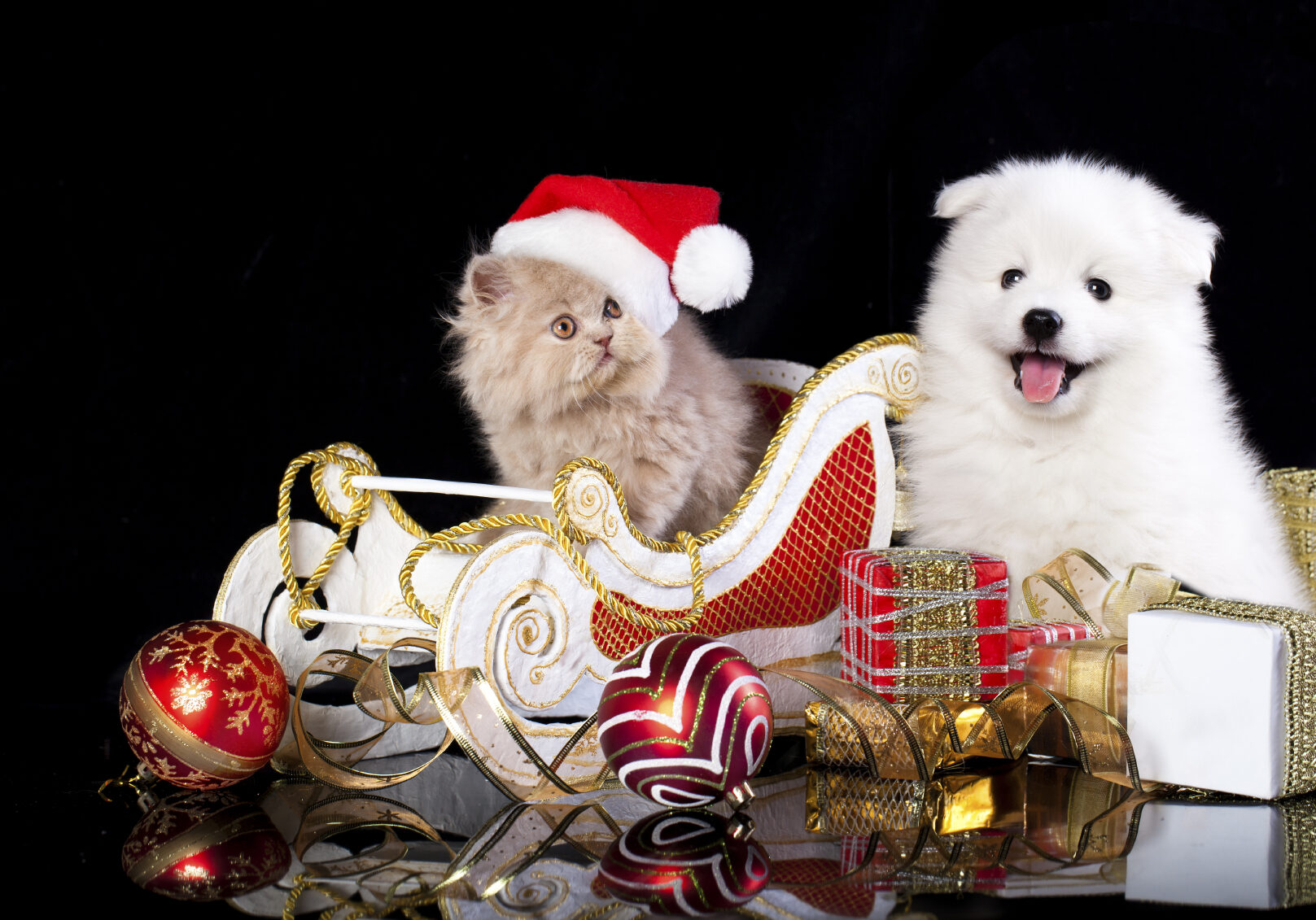
HOLIDAY SAFETY FOR YOUR PETS....FOR A MERRY SEASON FOR ALL!
Microchip your pet and complete the registration. If your pet is already micro-chipped, double check the microchip and update all of the information attached to the microchip. Many pets become lost during holiday celebrations.
Reduce stress by keeping feeding and exercise on a regular schedule. When pets are stressed by holiday activity or during travel, they may require more water. Dogs typically pant more when they feel stressed. Keep fresh water available for them to drink.
Many holiday plants can lead to health problems in dogs and cats. Among the plants to keep out of reach are holly, mistletoe, poinsettias and lilies.
Snow globes often contain antifreeze, which is poisonous to pets.
Pine needles, when ingested, can puncture holes in a pet’s intestine. So keep pet areas clear of pine needles.
The extra cords and plugs of holiday lights and other fixtures can look like chew toys to pets. Tape down or cover cords to help avoid shocks, burns or other serious injuries. Unplug lights when you are not home.
Anchor Christmas trees to the ceiling if possible with a string to keep it from falling on pets. Many animals cannot resist the urge to climb the tree.
Do not let pets drink the holiday tree water. Some may contain fertilizers, and stagnant tree water can harbor bacteria. Check labels for tree water preservatives and artificial snow, and buy only those that are nontoxic. Some folks use screens around trees to block access to electrical cords and gifts. Very important: do not put aspirin in the water (some folks do this thinking it will keep the tree or plant more vigorous). If a pet ingests the aspirin-laced water, his health or even life can be at risk.
Keep other ornaments out of reach of pets. Ingestion of any ornament, which might look like toys to pets, can result in life-threatening emergencies. Even ornaments made from dried food can lead to ailments. And remember, shards from broken glass ornaments can injure paws, mouths and other parts of the body.
Pets, particularly cats, can be tempted to eat tinsel, which can block the intestines. Hang tinsel high and securely to keep it out of reach of pets.
Small plastic pieces and rubber balls are common causes of choking and intestinal blockage in dogs. Ingested plastic or cloth toys must often be removed surgically. Please put away toys after children open their gifts.
Avoid toxic decorations. Bubbling lights contain fluid that can be inhaled or ingested, snow sprays and snow flock can cause reactions when inhaled, Styrofoam poses a choking hazard, tinsel can cause choking and intestinal obstruction, and water in snow scenes may contain toxic organisms such as Salmonella.
Keep candles on high shelves. Use fireplace screens to avoid burns.
Holiday guests and other activity can be very stressful and even frightening to pets. It can also trigger illness and intestinal upset. Make sure pets have a safe place to retreat in your house. And make sure they are wearing current I.D. in case they escape out a door when guests come and go.
Do not let guests feed your pet’s human food. There are many holiday foods, including fatty meats, gravies, poultry skin, bones, chocolate and alcohol that can cause illnesses from vomiting and diarrhea to highly serious pancreatitis and other toxic reactions. In addition, candy wrappers, aluminum foil pieces and ribbons can choke pets.
Keep pets away from gift packages and the gift wrapping. Ingested string, plastic, cloth and even wrapping paper can lead to intestinal blockage and require surgical removal. And pets have been severely injured by scissors and other items left on floors and tables.
Keep pets away from the garbage. Use pet-proof containers.
If you suspect that your pet has eaten something toxic, glass, broken plastic, staples or other small, sharp objects, call your veterinarian immediately.
Always make time to care for your pets. Some folks get lax about walking their dogs, and a few resort to letting pets out on their own. This puts the animal in danger, while also leading to nuisance complaints and dog bite incidents. Remind pet owners not to take a holiday from responsibly caring for their pets.
